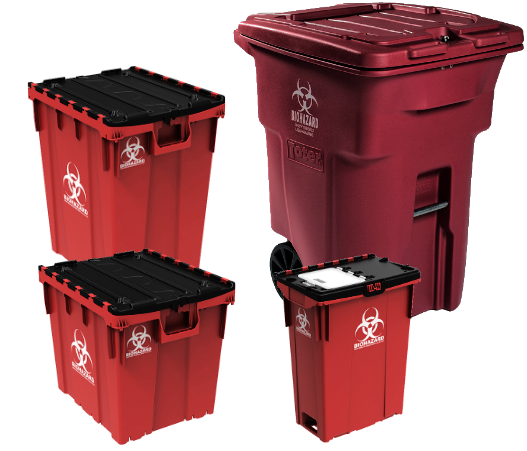Health Care Health Heroes: The Unsung Role of Medical Waste Removal Service
Health Care Health Heroes: The Unsung Role of Medical Waste Removal Service
Blog Article
The Value of Appropriate Waste Disposal Practices
From the consequences of inappropriate waste disposal on our environment to the long-lasting effects for future generations, the significance of embracing sustainable waste administration techniques can not be overemphasized. By exploring the environmental effect of irresponsible waste disposal, the benefits of reusing campaigns, and the importance of community interaction in waste decrease initiatives, a deeper understanding of why appropriate waste disposal techniques are crucial emerges.
Environmental Effect of Improper Disposal
Inappropriate disposal of waste presents a considerable risk to the setting due to its destructive effects on ecosystems and human health. When waste is not effectively taken care of, it can lead to contamination of the water, dirt, and air, causing harm to various plant and pet varieties. click here. Chemicals and toxins from incorrectly disposed waste can leak into the ground, polluting groundwater sources and impacting the health and wellness of both wild animals and humans
Moreover, the accumulation of waste in garbage dumps creates greenhouse gases like methane, adding to climate change and worldwide warming. Improper disposal practices also result in littering, which not only degrades the visual worth of the atmosphere however can likewise hurt wildlife via intake or complication.
To mitigate these environmental influences, it is crucial for people and areas to take on correct garbage disposal techniques such as recycling, composting, and liable dangerous waste disposal. By taking these steps, we can help secure ecosystems, maintain all-natural resources, and protect human health for future and existing generations.
Benefits of Recycling Programs
Frequently participating in reusing programs provides countless benefits for both the atmosphere and society in its entirety. One of the key advantages of recycling is the preservation of natural resources. By recycling materials such as paper, plastic, metal, and glass, much less basic materials need to be removed from the earth, bring about minimized deforestation, mining, and boring activities. This preservation of sources not just helps in maintaining environmental balance however also adds to sustainable advancement.
Moreover, reusing plays a crucial function in decreasing power consumption and greenhouse gas discharges. The manufacturing of products from recycled products normally calls for less power contrasted to producing from virgin resources - medical waste removal near me. Therefore, the carbon footprint associated with the manufacturing procedure is significantly reduced, helping in the battle versus climate modification
In addition, reusing programs create job opportunities in the recycling market, promoting financial development and social well-being. By encouraging the recycling and reuse of materials, these programs support a circular economy that decreases waste generation and makes best use of resource efficiency, ultimately resulting in a cleaner, greener future for generations to find.
Hazardous Waste Monitoring Guidelines
Implementing effective hazardous waste management standards is critical for minimizing environmental and health risks connected with the improper disposal of unsafe products - click here. Correct handling, therapy, and disposal of unsafe waste are important to prevent contamination of soil, water resources, and air
One trick standard appertains labeling of contaminated materials containers to guarantee risk-free handling and transport. Furthermore, facilities should stick to strict storage needs to protect against leakages, spills, or mishaps that could endanger human health and wellness and the atmosphere. Routine training programs for employees on contaminated materials monitoring techniques are likewise important to guarantee compliance with policies and advertise a society of security.
Furthermore, contaminated materials needs to be segregated based upon its homes to stop chemical responses that can result in dangerous scenarios. Executing a thorough waste tracking system can help keep an eye on the movement of hazardous products from generation to disposal, ensuring openness and accountability. By adhering to these guidelines faithfully, markets and companies can contribute to a much safer and cleaner environment for present and future generations.
Community Participation in Waste Reduction
To successfully deal with the ecological and health threats related to contaminated materials management, engaging the neighborhood in waste reduction campaigns is paramount. Neighborhood participation plays a vital role in promoting lasting waste management techniques and fostering a culture of environmental duty. By educating locals concerning proper waste segregation, reusing, and composting strategies, communities can substantially lower the amount of waste sent to garbage dumps, thus decreasing environmental pollution and saving natural deposits.
Community involvement in waste decrease programs additionally aids in elevating awareness about the significance of waste minimization and motivates individuals to take on environment-friendly behaviors in their lives - medical waste disposal. Joint initiatives in between neighborhood authorities, waste management business, and community members can result in the application of efficient waste reduction techniques tailored to the details demands of each area or community
In addition, area involvement promotes a sense of ownership and accountability amongst homeowners, encouraging them to take positive steps towards reducing waste generation and promoting a cleaner, healthier environment for existing and future generations. By collaborating in the direction of typical waste reduction objectives, areas can make a considerable influence on alleviating the unfavorable impacts of incorrect waste disposal techniques.

Future of Sustainable Waste Practices
Typical waste disposal methods, such as landfilling and incineration, are no much longer lasting in the lengthy term due to their substantial environmental impacts. Moving ahead, the future of sustainable waste methods lies in accepting a round economic situation strategy, where sources are recycled, reused, or repurposed to reduce waste generation.
Technical innovations play a key role fit the future of sustainable waste practices. Advanced waste sorting and recycling technologies can aid enhance the effectiveness of waste administration procedures, permitting for the recuperation of beneficial sources from waste streams. Furthermore, the adoption of naturally degradable materials and composting techniques can aid minimize the amount of organic waste finishing up in land fills, thus alleviating greenhouse gas exhausts.
Moreover, promoting consumer recognition and education and learning on appropriate waste segregation and disposal techniques is crucial for driving behavior modification towards sustainability. By promoting a society of waste reuse, decrease, look at here and recycling, communities can jointly add to a cleaner and healthier environment for future generations.

Final Thought
To conclude, proper waste disposal practices are critical for minimizing environmental influence and advertising sustainability. By executing recycling programs, handling unsafe waste correctly, and motivating community involvement in waste reduction efforts, we can function in the direction of a cleaner and much healthier setting. It is necessary for individuals, businesses, and federal governments to prioritize sustainable waste methods for the future health of our earth.

From the effects of inappropriate waste disposal on our atmosphere to the long-lasting ramifications for future generations, the relevance of adopting lasting waste administration practices can not be overemphasized. By discovering the environmental impact of irresponsible waste disposal, the advantages of reusing efforts, and the importance of area involvement in waste reduction efforts, a much deeper understanding of why appropriate waste disposal practices are crucial arises.
By informing residents concerning appropriate waste segregation, reusing, and composting strategies, neighborhoods can considerably reduce the quantity of waste sent to land fills, consequently lessening environmental contamination and conserving all-natural resources. (click here)
Relocating forward, the future of sustainable waste techniques exists in welcoming a round economy approach, where resources are recycled, reused, or repurposed to decrease waste generation.
Advanced waste sorting and reusing innovations can aid improve the effectiveness of waste management processes, permitting for the recuperation of beneficial sources from waste streams.
Report this page